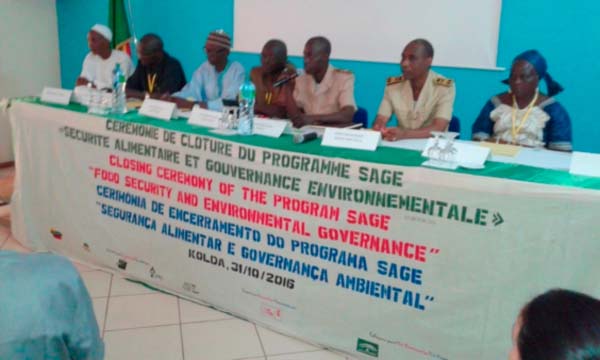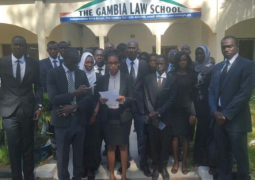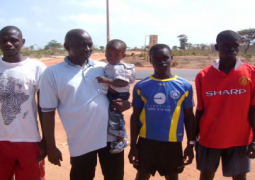
The
project partner NGOs of the Sustainable Agriculture for Environmental
Governance (SAGE) in The Gambia, Senegal and Guinea Bissau, recently converged
at Kolda in the Southern Casamance of Senegal for the closing ceremony of the
SAGE project.
The
project was funded by Spanish Agency for International Development Cooperation
(AECID) NGO.
The
five-year project was implemented by the NGOs of Agency for the Development of
Women and Children (ADWAC) in The Gambia, APRODEL in Guinea-Bissau and FODDE in
Senegal.
The
project focused on the environment, food security and land management.
Speaking
at the closing ceremony, Almudena Moreno Fernandez, the director of the Spanish
Agency for International Development Cooperation (AECID) NGO, lauded partner
NGOs in the three countries for their invaluable support to the implementation
of the five-year project.
The
objective of the project was to increase food production and strengthen the capacity
of rural farmers on reduction of post-harvest losses on farm produce, and
improve marketing of produce to improve lives and livelihood.
The
result of the implementation of the SAGE agreement would manifest itself in
enhancing “Food Security and Environmental Governance in Senegal, The Gambia
and Guinea-Bissau,” he continued.
According
to Fernandez, talking about the border zones of the three countries, the
approach requires a strategy which goes beyond the existing political and
administrative barriers, as the natural and productive resources do not know
the physical barriers.
Since
2010, he added, the agreement (convention) contributed to the food safety and
the environmental governance in the above countries, as an answer to the
challenges of the resource management shared and integration of the waterside
communities.
Oumar
Mbaye, assistant governor for Administration of Kolda, thanked the project
partner NGOs of the three countries, for their commitment in building and
strengthening the capacity of cross-border villages on forest management and
sustainable land governance to improve food production and productivity.
He
noted that the intervention of the Spanish international NGO in working with
NGOs from The Gambia, Senegal and Guinea-Bissau has contributed to cementing
the bilateral ties between the participating countries.
Masamba
Joof, executive director of ADWAC, commended the governments of the three
countries for providing an environment conducive for NGOs in complementing
their development efforts, to bring about sustainable livelihood of the
cross-border communities.
He
noted that the cross-border programme has enhanced the quest for regional
integration, adding that the five-year implementation of the SAGE has empowered
the participating countries to promote shared learning on best practices of
environmental governance, food security, land planning and management.
Joof
disclosed that 11,862 improved cooking stoves were distributed along the border
villages of The Gambia and Casamance, out of which 127 households along the
Gambia/Cassamance border and 120 households between the border villages of
Bissau and Senegal benefitted from the package.
The
initiative had contributed to a reduction of fuel consumption from 40 to 50 per
cent, and had improved the health of families.
The
ADWAC director further asserted that the project had built the capacity of
environment technical committees along the border villages, supported schools
to establish environmental clubs to expose students on environmental
management, and promoted cross-border shared learning among beneficiary farmers
to enhance effective management of forest and environmental management.
The
cross-border programme availed opportunities for beneficiaries to map out
strategies and bylaws to promote environmental management, bushfire management
and control, and supported the establishment of tree nurseries as alternative
measures of propagating local forests.
Mr
Joof reiterated the enormous support and collaboration ADWAC has continued to
benefit from SAGE, and its implementing partners FODE in Senegal and APRODEL in
Guinea-Bissau, during periodic joint project review and planning meetings in
Kolda, Senegal.
However,
he said, as part of inter-country programmes, ADWAC is leading the environment
and energy component, FODE in Senegal leads food security, whilst APRODEL in
Guinea-Bissau is leading the inland management component and, as a result, it
would strengthen regional integration of the three countries.
He
noted that the partnership had enabled implementing partners to share best
practices and techniques of promoting sustainable agriculture and environment
governance programmes along the border villages.
The
partnership has promoted the integrated management of sectoral programming, and
by extension giving high priority to women advancement in all component of SAGE
project.
Modou
Jagne, a representative of the Governor of Central River Region, lauded the
partner NGOs of the three countries for their steadfastness in complementing
the efforts of their governments in promoting sustainable environmental
governance.
He
said strengthening the capacity of beneficiary communities would contribute to
the attainment of food security and poverty reduction.
Jagne
said the intervention of partner NGOs is in line with government policies in
improving lives and livelihood, and he called on the donor to support in the
expansion of the project, noting that it had improved the lives of rural
dwellers along the border.
Read Other Articles In Article (Archive)




